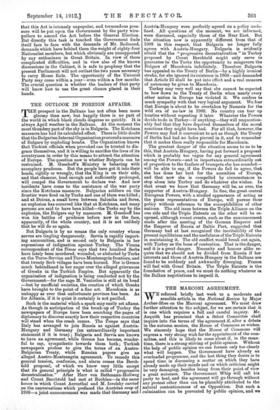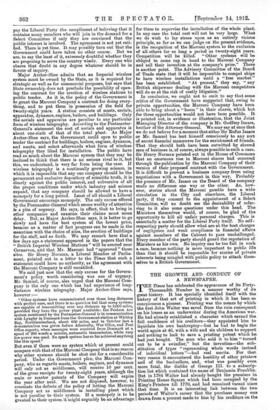THE MA.RCONI AGREEMENT.
WE referred briefly last week to a moderate and sensible article in the National Review by Major Archer-Shee on the Marconi agreement. We must draw further attention to the subject, for we are certain that it is one which requires a full and careful inquiry. Mr. Asquith has promised that a Select Committee shall Inquire into the terms of the agreement if, after a debate in the autumn session, the House of Commons so wishes. We sincerely hope that the House of Commons will express a. very strong wish for the appointment of the com- mittee, and this is likely to come about if, in the mean- time, there is a strong stirring of public opinion. Without the help of public opinion we can foresee only too clearly what will happen. The Government have already an overloaded programme, and the last thing they desire is to spend time in discussing a matter on which they have already made up their minds and on which criticism might be very damaging, besides being from their point of view a great nuisance. The Government Whip will call his party to heel, and the agreement will go through without any protest other than can be plausibly attributed to the natural contentiousness of an Opposition. But such a culmination can be prevented by public opinion, and we pay the Liberal Party the compliment of believing that it contains many members who will join in the demand for a Select Committee if only they are convinced that the public interest is involved. The agreement is not yet rati- fied. There is yet time. It may possibly turn out that the Government could have taken no other course. But we are, to say the least of it, extremely doubtful whether they are proposing to serve the country wisely. Every one who shares that doubt in any degree whatever should be in favour of inquiry.
Major Archer-Shee admits that an Imperial wireless system must be owned by the State, as it is required for strategic as well as for commercial purposes, but says that State ownership does not preclude the possibility of open- ing the contract for the erection of wireless stations to public tender. As it is, the policy of the Government is to grant the Marconi Company a contract for doing every- thing, and to put them in possession of the field for twenty-eight years. A station consists of masts, aerials, apparatus, dynamos, engines, boilers, and buildings. Only the aerials and apparatus are peculiar to any particular form of wireless telegraphy. According to the Postmaster- General's statement the cost of aerials and apparatus is about one-sixth of that of the total plant. As Major Archer-Shee says, the Government could open to public tender the contract for buildings, boilers, engines, dynamos, and masts, and select afterwards what form of wireless telegraphy they liked for installation. The public have read so much about the Marconi system that they may be inclined to think that there is no serious rival to it, but this, we understand, is very far from being the case. If wireless telegraphy is a continually growing science, in which it is impossible that any one company should be the permanent and exclusive depository of scientific truth, it is clearly against the public interest, and subversive of all the proper conditions under which industry and science expand, that any company should be allowed to have a monopoly for a long period. Least of all should a Liberal Government encourage monopoly. The only excuse offered by the Postmaster-General which seems worthy of attention is a plea of urgency. He says, in effect, that to bring in other companies and examine their claims must mean delay. But, as Major Archer-Shee says, it is better to go slowly and have the best system at the lowest price, because as a matter of fact progress can be made in the meantime with the choice of sites, the erection of buildings for the staff, and so forth. We may remark here that a few days ago a statement appeared in the papers that the "British Imperial Wireless Stations" will be erected near Carnarvon, mid that Mr. Marconi bad "approved" these sites. Sir Henry Norman, a Liberal Member of Parlia- ment, pointed out in a, letter to the Times that such a statement could have no authority, as the agreement with the Marconi Company is still unratified.
We said just now that the only excuse for the Govern- ment's policy worth considering was one of urgency. Mr. Samuel, of course, also urged that the Marconi Com- pany is the only one which has had experience of long- distance wireless telegraphy. Major Archer-Shee says, however :— "Other systems have communicated over these long distances with perfect ease, and there is no question but that many systems are capable of transmitting over any distance up to 3,000 miles, provided they have the power plant available : the Poulsen Arc system mentioned by the Postmaster-General is in communication with Lyngby in Denmark from the Government station at Whitley Bay, Northumberland, about 600 miles, and in October last a demonstration was given before Admiralty, War Office, and Post Office experts, when messages were received from Denmark at a speed of 200 words a minute, automatic transmission, while very low power was used. No spark system has so far achieved anything like this speed."
But even if there were no system which at present could compare with that of the Marconi Company that is no reason why other systems should be shut out for a considerable period. Under the Government plan, the Marconi Com- pany, who as regards masts, boilers, engines, and dynamos will only act as middlemen, will receive 10 per cent. of the gross receipts for twenty-eight years, although the main or master patents of the Company will expire the year after next. We are not disposed, however, to overstate the defects of the policy of letting the Marconi Company act as middlemen in installing plant which is not peculiar to their system. If a monopoly is to be granted to their system it might arguably be an advantage for them to supervise the installation of the whole plant. In any case the total cost will not be very large. What we do wish to lay stress upon as an entirely vicious principle, so far as we can judge on the present evidence, is the recognition of the Marconi system to the exclusion of all others for so long a period as twenty-eight years. Competition will be killed. "Other systems will be obliged to come cap in hand to the Marconi Company and sell their invention at the company's price." There is another point. The Advisory Committee of the Board of Trade state that it will be impossible to compel ships to have wireless installations until a "free market" has been established. "At present," they say, "any British shipowner dealing with the Marconi competitors will do so at the risk of costly litigation."
In conclusion, we ought not to omit to say that some critics of the Government have suggested that, owing to private opportunities, the Marconi Company have been able to bring about a " boom " in their shares, which but for these opportunities would not have been possible. It is pointed out, in evidence or illustration, that the Joint Managing Director of the company is Mr. Godfrey Isaacs, brother of the Attorney-General. We may say at once that we do not believe for a moment that either Sir Rufus Isaacs or Mr. Samuel has lent himself consciously to any sort of secret financial manceuvre for the enrichment of friends. That they should both have been outwitted by shrewd men of business is, of course, always possible in such a case. Sir Henry Norman pointed out in the House of Commons that an enormous rise in Marconi shares had occurred through the publication by the Marconi Company of their version of their proposed contract with the Government. It is difficult to prevent a business company from using negotiations with a Government in this way. Probably the presence of Mr. Isaacs on the Board of the company made no difference one way or the other. As, how- ever, stories about the Marconi gamble have a wide circulation in the City and elsewhere, the Liberal party, if they consent to the appointment of a Select Committee, will no doubt see the desirability of refer- ring to it also some questions under this head. The Ministers themselves would, of course, be glad of the opportunity to kill all unfair personal charges. This is essentially a matter for the Liberal Party itself. No self - respecting party should allow what are at the best charges of negligence and weak compliance in financial affairs against members of the Cabinet to pass unchallenged. Every member of the party should guard the reputation of Ministers as his own. No inquiry can be too full in such a case, because nothing is more important to public life than that it should be impossible for stories of private interests being mingled with public policy to attach them- selves to a British Government.







































 Previous page
Previous page